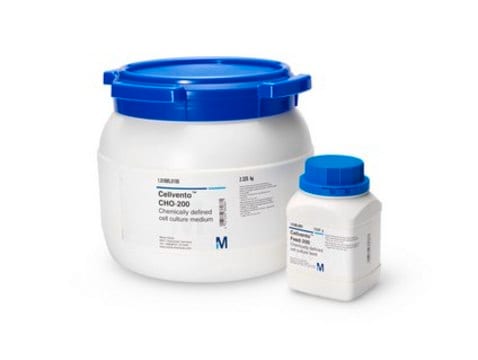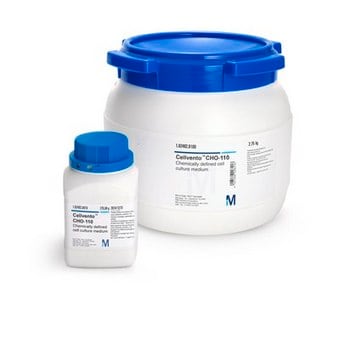1.01883
Cellvento® Feed-200
Chemically defined cell culture feed
Pharma Manufacturing
About This Item
Recommended Products
Quality Level
description
shipped with cooling packs
product line
Cellvento®
form
dry powder
technique(s)
cell culture | mammalian: suitable (suspension)
storage temp.
2-8°C
General description
Application
Quantity
Legal Information
Storage Class Code
11 - Combustible Solids
WGK
WGK 2
Certificates of Analysis (COA)
Search for Certificates of Analysis (COA) by entering the products Lot/Batch Number. Lot and Batch Numbers can be found on a product’s label following the words ‘Lot’ or ‘Batch’.
Already Own This Product?
Find documentation for the products that you have recently purchased in the Document Library.
Related Content
This page summarizes key considerations related to regulatory expectations for biomanufacturing including chemicals and polymeric materials. For chemicals, topics include nitrosamines and elemental impurities, and for polymeric materials such as filters and single-use assemblies, the focus is qualification and extractable and leachable testing.
This page summarizes key considerations related to regulatory expectations for biomanufacturing including chemicals and polymeric materials. For chemicals, topics include nitrosamines and elemental impurities, and for polymeric materials such as filters and single-use assemblies, the focus is qualification and extractable and leachable testing.
This page summarizes key considerations related to regulatory expectations for biomanufacturing including chemicals and polymeric materials. For chemicals, topics include nitrosamines and elemental impurities, and for polymeric materials such as filters and single-use assemblies, the focus is qualification and extractable and leachable testing.
This page summarizes key considerations related to regulatory expectations for biomanufacturing including chemicals and polymeric materials. For chemicals, topics include nitrosamines and elemental impurities, and for polymeric materials such as filters and single-use assemblies, the focus is qualification and extractable and leachable testing.
Our team of scientists has experience in all areas of research including Life Science, Material Science, Chemical Synthesis, Chromatography, Analytical and many others.
Contact Technical Service








